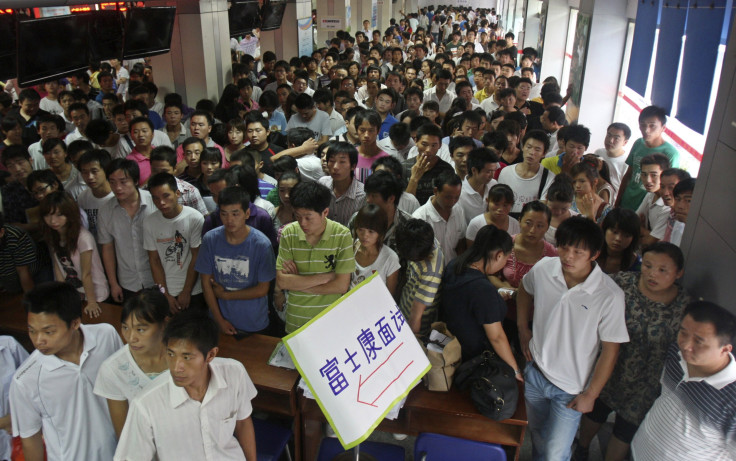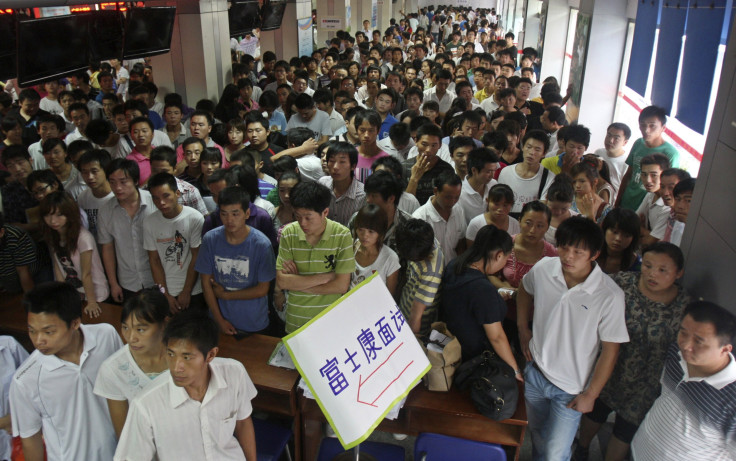The Life, And No Dreams, Of A Foxconn Worker Who Makes $300 A Month

Li Xiang, a Foxconn worker who spoke under a pseudonym, is a second-generation Chinese farmer, a generation that usually gives up farm work and tries to find work in cities. And that's what he did. He has been working on a Foxconn production line for two years, according to Xinhua News Agency. And now, working for the manufacturer that produces many Apple (Nasdaq:AAPL) products has him profoundly disillusioned.
“I don’t have much hope in life,” the 26-year old told Xinhua. “I’m not sure where to go from here.”

“Find a job that can support a family, buy a house, get married, have children, and let my mother rest,” was Li’s dream, which never changed since he began working at 18 as a technical school graduate.
It’s an ordinary aspiration, but something that looks impossible for Li.
Every day, tens of thousands of Apple iPhones pass through Li’s hands, and go on to consumers around the world -- many his age -- but Li has an entirely different experience with the device.
“The iPhones I’ve touched could stack up to a two-story house by now, but the money I’ve earned isn’t enough to buy enough bricks to build a house like that!” Li said. He doesn’t have a good degree or a skill. He just repeats the same simple and mechanical motion. “My youth is almost gone, who will tell me where my future is?”
Li is from a rural part of Henan province in central China. He attended a technical school, and studied to be a fitter -- someone who fits machinery together -- but couldn’t find a job in his specialty after graduation. To feed himself, he started working in small factories along the coast of southern China as an unskilled laborer. His monthly wage was about 1,000 yuan ($162.45), and he couldn’t save anything.
In 2011, Foxconn’s Zhengzhou factory, close to Li’s hometown, began to hire workers. Li hoped it could mean a better life in the beginning, working for a Fortune 500 company close to home.
Li’s responsibility is a part of the varnishing process; he hangs the product on a brace on the production line. He works for 11 hours a day, from 7:30 a.m. to 6:30 p.m., 11 hours of the same motion. His monthly salary is still hovering around 2,000 yuan for his long work days.
“After a while at Foxconn, my days filled with resistance, anger, despair, endure…” Li posted on his Weibo (China’s most popular microblogging site) account. “My aspirations are beginning to disappear, I even tell myself, ‘this is life.’”
In 2012, Li was promoted to a technician, one rung up from a production line worker, but this is just the second rung of a 13-rung corporate ladder at Foxconn. His life didn’t change much -- still just work and sleep.
“I don’t have a degree or a skill, what else can I do if I leave here?” Li said. Many times he thought about leaving, but reality would always stop him. His repetitive work is not skilled labor.
His real dream is working for an NGO serving laborers. “We create value without being able to enjoy the fruit of our labor,” Li said. Many years of labor has made him realize how much help and recognition laborers like him need. He wants to work to uphold their rights.
“I can’t dream too far, the biggest thing is still to earn money so I can get married and have children, so my mother can rest easy,” Li said. A short while ago, he finally borrowed money and put a down payment on a house in his hometown. This put him under more pressure, but he finally had hope. Li wants to give his children a better future, so they don’t have to become laborers like him, Xinhua News reported.
© Copyright IBTimes 2024. All rights reserved.



















